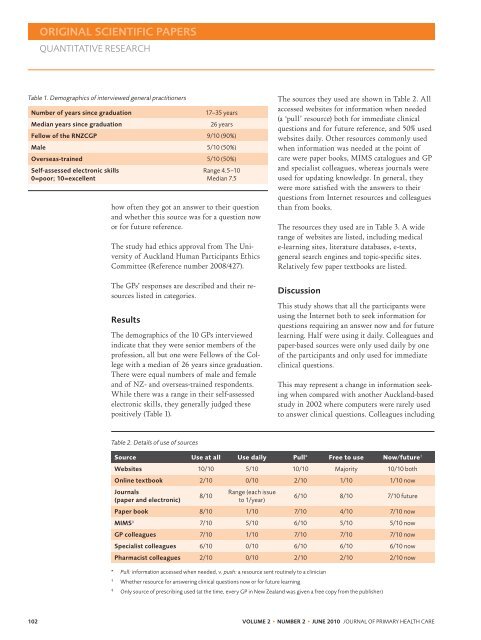entire issue - The Royal New Zealand College of General Practitioners
entire issue - The Royal New Zealand College of General Practitioners
entire issue - The Royal New Zealand College of General Practitioners
Create successful ePaper yourself
Turn your PDF publications into a flip-book with our unique Google optimized e-Paper software.
ORIGINAL SCIENTIFIC PAPERS<br />
quantitative research<br />
Table 1. Demographics <strong>of</strong> interviewed general practitioners<br />
Number <strong>of</strong> years since graduation<br />
Median years since graduation<br />
how <strong>of</strong>ten they got an answer to their question<br />
and whether this source was for a question now<br />
or for future reference.<br />
<strong>The</strong> study had ethics approval from <strong>The</strong> University<br />
<strong>of</strong> Auckland Human Participants Ethics<br />
Committee (Reference number 2008/427).<br />
<strong>The</strong> GPs’ responses are described and their resources<br />
listed in categories.<br />
Results<br />
17–35 years<br />
26 years<br />
Fellow <strong>of</strong> the RNZCGP 9/10 (90%)<br />
Male 5/10 (50%)<br />
Overseas-trained 5/10 (50%)<br />
Self-assessed electronic skills<br />
0=poor; 10=excellent<br />
Range 4.5–10<br />
Median 7.5<br />
<strong>The</strong> demographics <strong>of</strong> the 10 GPs interviewed<br />
indicate that they were senior members <strong>of</strong> the<br />
pr<strong>of</strong>ession, all but one were Fellows <strong>of</strong> the <strong>College</strong><br />
with a median <strong>of</strong> 26 years since graduation.<br />
<strong>The</strong>re were equal numbers <strong>of</strong> male and female<br />
and <strong>of</strong> NZ- and overseas-trained respondents.<br />
While there was a range in their self-assessed<br />
electronic skills, they generally judged these<br />
positively (Table 1).<br />
<strong>The</strong> sources they used are shown in Table 2. All<br />
accessed websites for information when needed<br />
(a ‘pull’ resource) both for immediate clinical<br />
questions and for future reference, and 50% used<br />
websites daily. Other resources commonly used<br />
when information was needed at the point <strong>of</strong><br />
care were paper books, MIMS catalogues and GP<br />
and specialist colleagues, whereas journals were<br />
used for updating knowledge. In general, they<br />
were more satisfied with the answers to their<br />
questions from Internet resources and colleagues<br />
than from books.<br />
<strong>The</strong> resources they used are in Table 3. A wide<br />
range <strong>of</strong> websites are listed, including medical<br />
e-learning sites, literature databases, e-texts,<br />
general search engines and topic-specific sites.<br />
Relatively few paper textbooks are listed.<br />
Discussion<br />
This study shows that all the participants were<br />
using the Internet both to seek information for<br />
questions requiring an answer now and for future<br />
learning. Half were using it daily. Colleagues and<br />
paper-based sources were only used daily by one<br />
<strong>of</strong> the participants and only used for immediate<br />
clinical questions.<br />
This may represent a change in information seeking<br />
when compared with another Auckland-based<br />
study in 2002 where computers were rarely used<br />
to answer clinical questions. Colleagues including<br />
Table 2. Details <strong>of</strong> use <strong>of</strong> sources<br />
Source Use at all Use daily Pull* Free to use Now/future †<br />
Websites 10/10 5/10 10/10 Majority 10/10 both<br />
Online textbook 2/10 0/10 2/10 1/10 1/10 now<br />
Journals<br />
(paper and electronic)<br />
8/10<br />
Range (each <strong>issue</strong><br />
to 1/year)<br />
6/10 8/10 7/10 future<br />
Paper book 8/10 1/10 7/10 4/10 7/10 now<br />
MIMS ‡ 7/10 5/10 6/10 5/10 5/10 now<br />
GP colleagues 7/10 1/10 7/10 7/10 7/10 now<br />
Specialist colleagues 6/10 0/10 6/10 6/10 6/10 now<br />
Pharmacist colleagues 2/10 0/10 2/10 2/10 2/10 now<br />
* Pull: information accessed when needed, v. push: a resource sent routinely to a clinician<br />
†<br />
Whether resource for answering clinical questions now or for future learning<br />
‡<br />
Only source <strong>of</strong> prescribing used (at the time, every GP in <strong>New</strong> <strong>Zealand</strong> was given a free copy from the publisher)<br />
102 VOLUME 2 • NUMBER 2 • JUNE 2010 J OURNAL OF PRIMARY HEALTH CARE

















